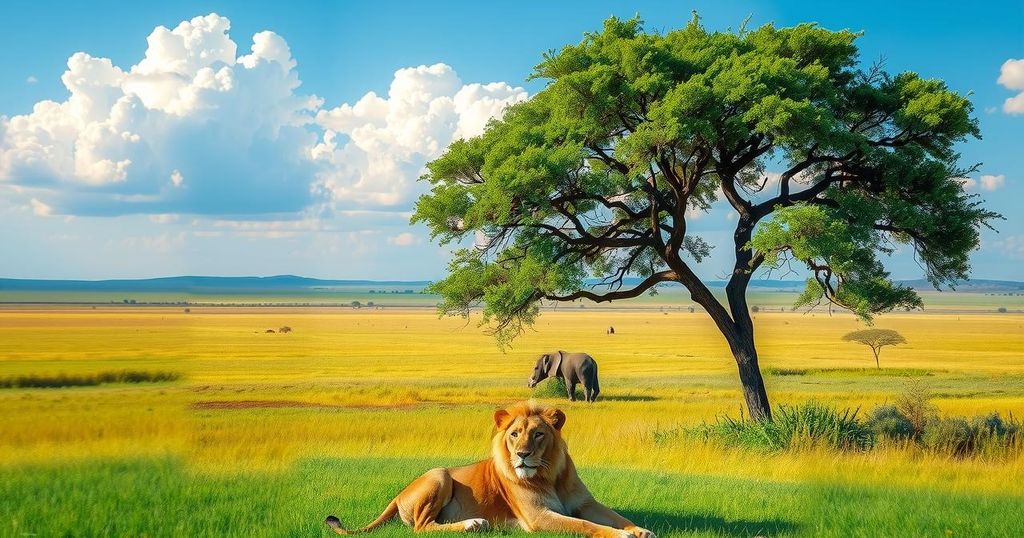Lion Kills 14-Year-Old Girl Near Nairobi National Park; Separate Elephant Attack Reported

In a shocking incident near Nairobi, a lioness killed a 14-year-old girl after entering a residential area. The Kenya Wildlife Service is investigating and has implemented measures like traps and early warning systems. Additionally, a separate elephant attack resulted in another tragic death. Both incidents emphasize the growing threats faced by communities near wildlife habitats, highlighting the need for better conflict mitigation strategies.
A tragic event unfolded just outside Nairobi, Kenya, when a lioness killed a 14-year-old girl at a ranch adjacent to Nairobi National Park. The Kenya Wildlife Service (KWS) reported that the incident occurred late Saturday night after the animal jumped over a makeshift fence. Paul Udoto, KWS Senior Corporate Communications Manager, confirmed that the girl was attacked inside her home, where she was with another teenager. According to Udoto, there’s no evidence suggesting any kind of provocation from the victims.
After the lioness entered the house, the second teenager quickly raised the alarm. This quick thinking led to a response from KWS rangers and emergency teams. Upon their arrival, they traced bloodstains to the Mbagathi River, where the girl’s body was found with significant injuries on her lower back. Authorities promptly set up a trap and have begun searching for the lioness, while also instituting enhanced security measures, including electric fencing and AI-driven early warning systems to alert locals about animal movements, Udoto elaborated.
In an unrelated occurrence, an elephant attacked a 54-year-old man grazing livestock in a forest within Nyeri County, Kenya. This incident happened a day before the lion attack. The man suffered serious injuries, including fractured ribs and was declared dead upon arrival at the hospital. KWS has emphasized that both of these attacks highlight a pressing need for ongoing efforts to mitigate human-wildlife conflict through strategic measures, better warning systems, and closer collaboration with affected communities.
Investigations into both incidents are ongoing, but initial findings suggest they are linked to environmental pressures and human encroachment on wildlife habitats. According to Udoto, the KWS suspects the lioness may have been disoriented or diverted from her natural hunting behaviors due to a lack of prey and increased human activity in the area surrounding the park. The elephant attack, on the other hand, was said to have resulted from the man’s incursion into the animal’s habitat, exacerbating conditions for such conflicts.
“KWS conveys its heartfelt condolences to the bereaved families and continues to work closely with local law enforcement and communities to enhance the safety of people living near protected wildlife areas,” said the agency. While attacks by lions and elephants are generally rare, they can occur in remote regions adjacent to national parks and game reserves.
According to Udoto, lion-on-human encounters represent less than 2% of all reported wildlife incidents. Conversely, incidents involving elephants tend to be more frequent, especially during dry seasons when animals migrate in search of water and food, which often leads them into agricultural lands or settlements. This underscores the significance of proactive measures in preventing future conflicts.
The recent deadly lion attack on a teenage girl and a separate elephant incident highlight the ongoing tensions between wildlife and human populations in Kenya. Both situation point to a pressing need for better strategies to mitigate human-wildlife conflict, especially in light of rising human encroachment. Continued collaboration between wildlife authorities and local communities is crucial to enhance safety measures and prevent further tragedies. Moreover, the emphasis on improving early warning systems and enhancing security around national parks is key to addressing these issues, as confirmed by KWS spokesperson Paul Udoto. The loss of life reflects an urgent call to action so that such incidents don’t recur in the future.
Original Source: edition.cnn.com







